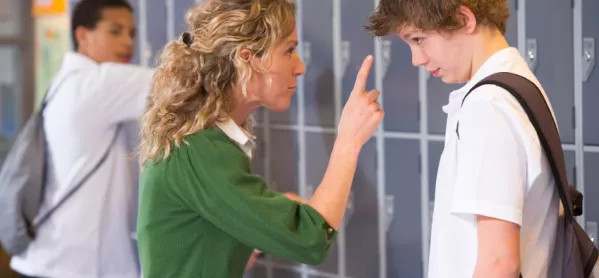These are the things that every teacher should be doing to ensure order in the classroom. They’re very basic, and open to endless interpretation, but I think that they represent a good place to start, whether it’s with a new class or an old one you want to reboot.
1. Set out your behaviour expectations from the moment you meet your students
This can be done by a whole lesson of talking, something stuck in their books, a poster on the wall: anything that gets the point across that there are rules in your classroom. Don’t assume that pupils know how you want them to behave. They know how to behave, but that’s not the same as knowing that YOU want them to do it. Many will assume that there are no rules until YOU tell them there are.
2. Have a seating plan
Before you meet your class, go into the room; sketch out where you want everyone to be. If you don’t know them, simply break them up alphabetically, or by gender (boy/girl is a popular option). This dislocates friendship groups, by introducing a random element into their pairings and groupings. Not only will a seating plan assist you with behaviour, but it will help you with point three, which is...
3. Know pupils’ names
This is essential, not to mention good manners. Make a point of speaking to every pupil in your class throughout the lesson at least once, and naming them. If you DON’T know their names, then any kind of sanctions become nearly impossible. Magicians used to believe that naming something gives you authority over it. They were right.
4. If students break the rules, they have to pay the penalty
Sanctions are an essential part of running a classroom. You might feel uncomfortable giving punishments - don’t. They are intrinsic to guiding pupils on to the path of better behaviour. They need to be FAIR, CONSISTENT, and PROPORTIONATE. Don’t be inconstant or whimsical. The sooner that students learn that they can’t get away with mucking around, the sooner you get to a safe place where everyone’s learning is maximised.
5. Follow up
If at first you don’t succeed, keep it up. If students try to avoid your first sanction, then escalate, and involve other parties higher up the food chain.
6. Don’t walk alone
You can’t do it all by yourself: you exist in a structure, a hierarchy of adults and authority that can all be wielded for your purposes. Line management, SLT, heads of year, department heads, mentors, other teachers can all be brought to your disposal. Badly behaved students are - almost without exception - badly organised, and work alone. If you work with others, you have the strength of ten.
7. Get the parents involved
Some parents are unsupportive, but they are by far in the minority. The vast majority want the best for their children, just like you do. A phone call home (done in a sympathetic, adult manner, not indignant and accusative) can work wonders, as you extend your classroom discipline all the way home.
8. Don’t freak out
Sounds obvious, but this is a common error. If you’re not getting the behaviour you need, then it’s very tempting to blow your nut and scream your head off. Never do this; it then makes it easy for students to put their feet up and think, “Oh boy, TV”. It’s a totally disproportionate response to most classroom behaviours and besides, many kids get worse at home. But mostly, it makes you look weak. Be the king of your own calm kingdom (© The Little Book of Calm).
9. Be prepared
Try to be there before them; to have your resources ready; to have a lesson planned in advance; to know what you’re talking about. If the students think you’re more badly organised than them, they’ll rarely respect you.
10. Be the teacher, not their chum
The mental attitude you need to succeed is: “They are here to learn, and my job is to help make that happen”. Don’t try to be their friend, because they’re not; they need rules, boundaries, and an adult who will treat them with manners and civility, to encourage them to do the same. But never forget that you are an authority figure with a responsibility for their education. You’re not an entertainer, although you may be entertaining. You’re not a confidante, although you may also serve that function; you’re not their mate, although you may eventually grow to like each other. You’re the teacher. So be the teacher.
For all of Tom’s best behaviour videos click here.





